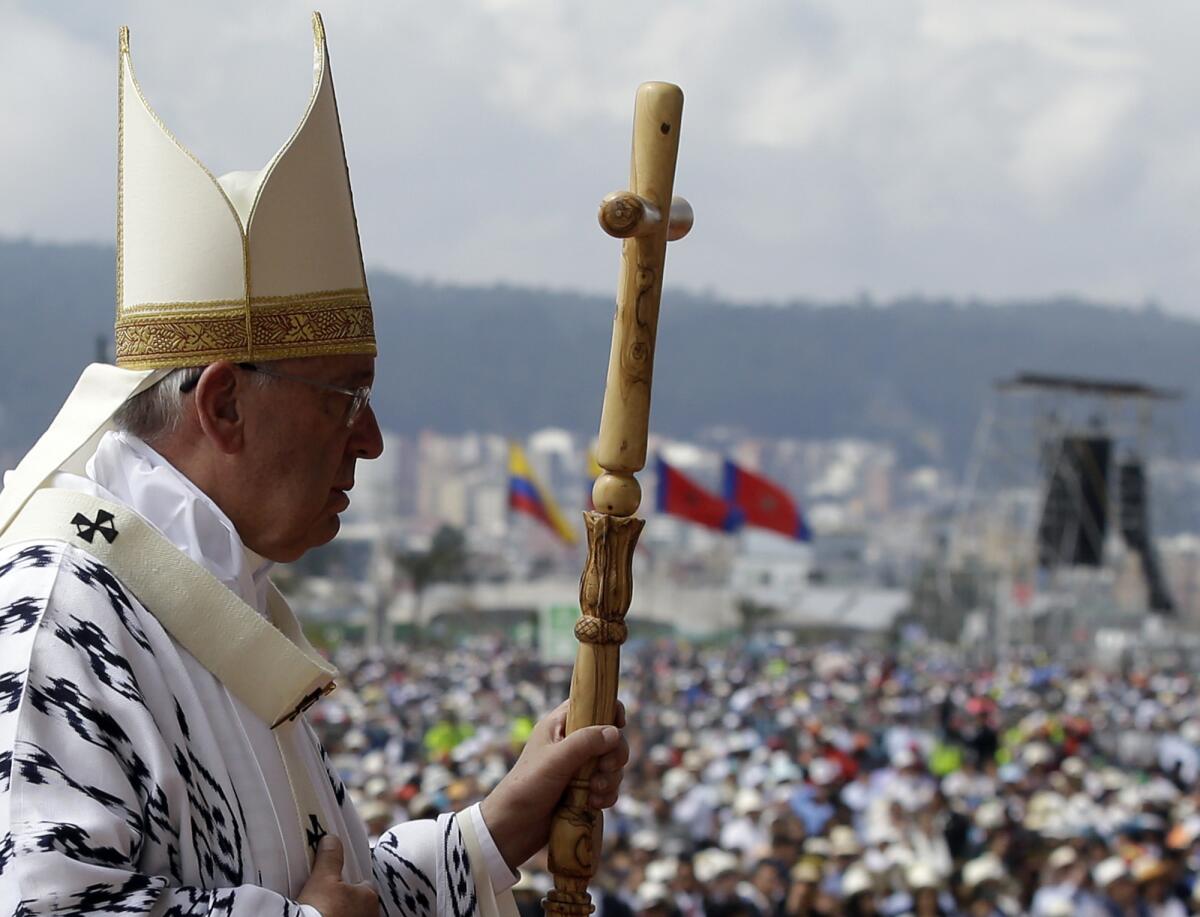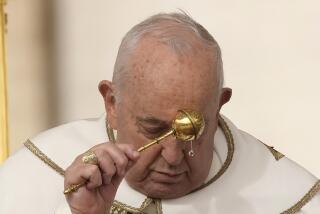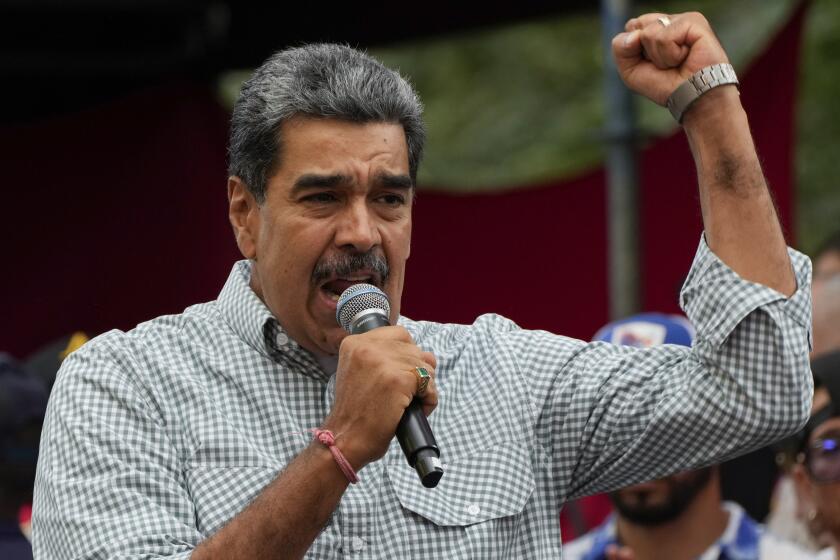Crowd estimated at near 1 million hears Pope Francis extol unity in Ecuador

Pope Francis walks with his pastoral staff to celebrate Mass at Bicentennial Park in Quito, Ecuador, on Tuesday.
Pope Francis, delivering his second massively attended sermon in his tour of South America, made an eloquent plea Tuesday for unity and inclusiveness on his native continent through what he portrayed as a more welcoming form of evangelization.
Speaking at this capital’s Bicentennial Park, which commemorates the independence from Spain that most of Latin America won two centuries ago, the pope also linked that struggle for freedom with the call to follow God.
“There was no shortage of conviction of strength in that cry for freedom, which arose a little more than 200 years ago,” the pope said, speaking in Spanish.
“But history tells us that it only made headway once personal differences were set aside, together with the desire for power and the inability to appreciate other movements of liberation which were different” yet not in opposition.
Francis’ message appeared aimed at disconnecting the often abusive evangelization of colonial-era Spanish Catholics from a broader embrace of the faith.
“Evangelization does not consist of proselytizing,” he said, departing from a prepared text to say that knowing God should be as simple as tapping on the door.
“No one is excluded,” he said, reiterating a common theme in his first trip as pope to Spanish-speaking Latin America. In 2013, he visited Portuguese-speaking Brazil.
On Wednesday he is to travel to Bolivia, then to Paraguay.
Tens of thousands of pilgrims, from all over Ecuador as well as neighboring countries, had been camping out at the park since the start of the week in anticipation of what is likely to be the pope’s largest event in this country.
Some estimates put the crowd at more than 800,000. Interior Minister Jose Serrano said via Twitter that as many as 900,000 people may have attended. They braved early-morning showers and chilly air.
“Being near Pope Francis is like a miracle; any sacrifice is worth it,” said Omar Eudoro Velasquez, a merchant who had traveled seven hours from Pasto, Colombia, with his wife and 16-year-old son.
The Mass was using 300,000 communion wafers, the governmental newspaper El Ciudadano reported, made by the nuns of the 17th century El Carmen Alto monastery, founded as the first site in Ecuador of the Order of Discalced Carmelites.
In his homily, the pope also made a plea for unity, part of a concept known as patria grande, or vast fatherland. The pope has frequently called for unity as a way to overcome society’s ills, reduce divisive and violent tension and include those who would otherwise be marginalized. The promotion of this concept on his native continent is of special importance to him, Vatican specialists say.
Like Jesus, the pope said, “we too encounter daily a world torn apart by wars and violence. It would be facile to think that division and hatred only concern struggles between countries or groups in society.
“Rather, they are a manifestation of that ‘widespread individualism’ which divides us and sets us against one another.”
Mankind must not respond with “nonchalance,” he said, or complain that “the problems are too big.” Instead, “we must respond by taking up the cry of Jesus and accepting the grace and challenge of being builders of unity.”
“Our unity can hardly shine forth if spiritual worldliness makes us feud among ourselves in a futile quest for power, prestige, pleasure or economic security on the backs of the most poor, the most vulnerable, those who do not lose their dignity despite being beaten down every day.”
The crowd applauded enthusiastically.
“The Mass was beautiful; I hope the pope’s message will be put in practice,” said Zoila Hernandez, 50, a professional driver. “We’ll see how the country reacts. I hope the people calm down,” she said, alluding to a long series of street demonstrations in recent weeks against the government of President Rafael Correa, which were suspended during the pope’s visit.
“The pope’s presence is an opportunity for the people to come together again, understand that we are brothers, reduce the distances among us that the politicians, especially the president, have widened,” said Homero Cardenas, a 58-year-old mechanic. “The pope’s message was spiritually enriching and reminds us we are all the children of the same father.”
In later appearances Tuesday, the Argentine-born pontiff waded closer to contemporary domestic politics.
Meeting with civic, political and indigenous groups, Francis was expected to get an earful from opponents of the Correa government. In his speech after private meetings with members of the groups, he appeared to be telling both Correa and his opponents to work better at ending their acrimony and negotiating and sitting down to dialogue.
The pontiff initially sounded tired, but he frequently departed from his prepared text and seemed to become more animated as he went along.
Members of a family work together, and so it should be in a national society, he said.
“Our relationships in society and political life ... in the broadest sense of the word ... are often based on confrontation and the attempt to eliminate our opponents,” he said. “If only we could view our political opponents or neighbors in the same way we view our children or our spouse, mother or father!”
Special correspondent Jaramillo Viteri reported from Quito and Times staff writer Wilkinson from Mexico City
Follow @TracyKWilkinson on Twitter for news from Latin America
More to Read
Sign up for Essential California
The most important California stories and recommendations in your inbox every morning.
You may occasionally receive promotional content from the Los Angeles Times.











